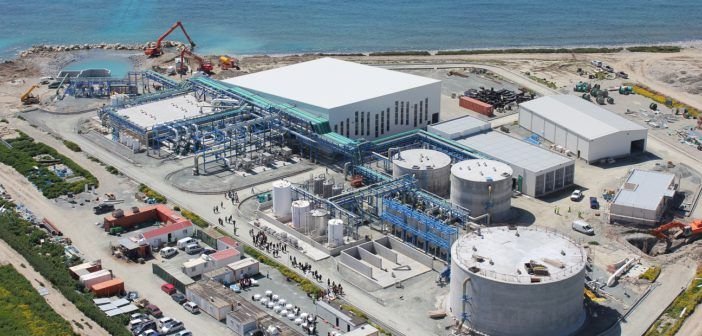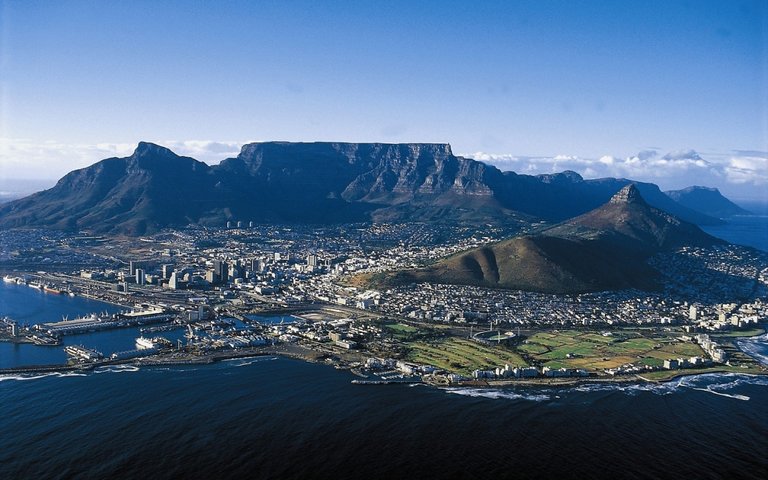Desalination is the process of removing salt and other minerals from water to make it suitable for human consumption. It has been praised by governments and private corporations as the answer to water shortages around the world, but is it really the perfect solution to water scarcity?. Desalination plants uses high amounts of energy, creates toxic by-products and the water produced might be causing health problems for people consuming it.
Cape Town's Water Crisis
The water crisis in Cape Town is an unnatural disaster, created to force people to accept water price increases, ridiculous by-laws, faulty water meters and also expensive and extreme measures such as desalination. Over the many years of low rainfall in Cape Town, the City's only response was to implement water restrictions.
No natural alternative water sources were made use of by the City, such as the millions of litres of natural spring water running into the sea everyday. Besides the water flowing into the sea, there is an untapped water resource under the City of Cape Town, the ' Table Mountain Group Formation Aquifer', which contains billions of cubic metres of clean drinkable water.
An aquifer is a body of permeable rock which can contain or transmit groundwater, the Table Mountain aquifer is one of the largest in the world and the only other aquifer with a similar rock formation can be found in South America.
Hermanus, a town about 120km from Cape Town, tapped into this water resource in 2011 and is not experiencing a water crisis. The City of Cape Town also had plans to make use of water from the aquifer in 2011, but the plans were put on hold.
Another failure by government was the failure to clear the canals leading to the Voëlvlei dam, The dam had been blocked by rubble that someone had dumped there in 2016, resulting in a loss of 7,5 million cubic metres of water, enough water for the whole of Cape Town for 2 weeks.
The City was warned more than a decade ago that Cape Town will run out of water but failed to take the necessary steps to avoid a crisis.
Desalination Bad for The Environment and Your Health
Pre-treatment of Water
To make the treatment of the water more efficient and successful, desalination requires pre-treatment and the adding of chemicals before the water is desalinated. The chemicals that are added include hydrogen peroxide, hydrochloric acid and chlorine. This is a major environmental concern as these chemicals often find their way into the ocean, poisoning plant and animal life.
Brine Production
The water that is left over after desalination has a super saturation of salt and most desalination plants dispose of this brine by pumping it back into the sea. Marine life cannot adjust to the change in salinity of the water, the brine causes a decrease in oxygen causing plants and animals to suffocate.
Negative Effects on Marine Life
Plankton and phytoplankton are the base of the food chain for all marine life and are the most commonly affected by the toxic by-products produced by desalination plants. When pumping water into the deslination plants, it's not only water that gets sucked in - animals, plants and eggs get trapped and killed in the process.
Negative Effects on Health
Magnesium a key mineral that is found in normal water, is not found in desalinated water leading to an increase in the risk of heart disease. In Israel, in areas where there is wide use of desalinated water, a study has shown that there is an elevated mortality risk of myocardial infarction.
Although they supply high quality water, it is devoid of some key minerals found in normal water, like magnesium. Magnesium shortages can raise the risk of heart disease, with some experts pointing to a significant shortage of this important mineral in the water.
Initial results of Israeli studies point to an elevated mortality risk of myocardial infarction in areas where there is wide use of desalinated water, said public health expert Prof. Yona Amitai, speaking recently at a Bar-Ilan University conference on regulating water supply.
https://www.haaretz.com/israel-news
The City of Cape Town releases 36-million litres of effluent a day into the sea, some of which would most likely find it's way into the desalination plants. A study done by the top Universities in the Western Cape showed that even after desalination, the water could still be contaminated.
"It is probable that the water recovered from desalination may still be contaminated with traces of complex pollutants after the [desalination] process... This probability represents a public health issue."
http://www.huffingtonpost.co.za
Sources:
The Disadvantages of Desalination
Ocean Desalination No Solution to Water Shortages
Cape Town’s untapped water source explored
Western Cape Moves In to Clear Vital Water Canals




Peace, Abundance, and Liberty Network (PALnet) Discord Channel. It's a completely public and open space to all members of the Steemit community who voluntarily choose to be there.Congratulations! This post has been upvoted from the communal account, @minnowsupport, by hoosain from the Minnow Support Project. It's a witness project run by aggroed, ausbitbank, teamsteem, theprophet0, someguy123, neoxian, followbtcnews, and netuoso. The goal is to help Steemit grow by supporting Minnows. Please find us at the
If you would like to delegate to the Minnow Support Project you can do so by clicking on the following links: 50SP, 100SP, 250SP, 500SP, 1000SP, 5000SP.
Be sure to leave at least 50SP undelegated on your account.
Your Post Has Been Featured on @Resteemable!
Feature any Steemit post using resteemit.com!
How It Works:
1. Take Any Steemit URL
2. Erase
https://3. Type
reGet Featured Instantly � Featured Posts are voted every 2.4hrs
Join the Curation Team Here | Vote Resteemable for Witness
I have dealt with R.O plants before and the amount of chemicals spent in treating the water is just to much, from 100% saline water, you get about 80% water and 20% saline water that is supersaturated with salt.
To show how bad the reject water was, we tried using it for irrigation, grass turned yellow in a matter of days, and it's the water that's being fed back into the oceans killing seaweed hence affecting an entire eco-system.
Issue is that we don't have scarcity of resources, we just don't know how to manage them well.
Wait, you're saying that the super-saturated salt water is the rejected water, right? And you attempted to use it to irrigate crops? Doesn't that attempt lack sense? The point is to use the desalinated water, not the saline water.
The issue was to prove how salty the reject water was, we had to show the boss saline water cant be used for irrigation because he kept insisting we use it.
Got it. I guess it was worth a test. But when you say desalination turns 0% valuable water into 80% valuable water, I'd say that's pretty fantastic.
Okay. Whoa. Let's back that up. Assuming that it's true that magnesium is not present in desalinated water, nowhere do you give any evidence that this lack of magnesium causes heart disease. Just because some place (Israel) uses desalinated water and also has a higher than average risk of heart disease, this correlation does not in any way prove or suggest causation. For all we know, desalination is a coincidence, and Israelis eat a lot of red meat or butter, or whatever.
I find this article highly irresponsible. Dwindling water supply is a growing global crisis. Desalination is the most hopeful solution out there.
If you have evidence to back up your claims, please post it. But drawing conclusions from weak or sloppy analysis is going to do more harm than good.
Here are three articles from israeli online news sources all pointing to a lack of 'magnesium' causing an increase in 'heart attacks'.
http://www.israelnationalnews.com/News/News.aspx/210501 https://www.haaretz.com/science-and-health/israel-dawdling-as-desalinated-water-kills-1.5462030 http://m.jpost.com/Business-and-Innovation/Health-and-Science/Could-desalinated-water-be-killing-hundreds-annually-460030
Thanks, I'll take a look. But I forgot to add to my original comment: even if it's true that lowering magnesium in water can lead to heart disease risk, that's easily fixed with a multi-vitamin. Surely we'd prefer water and a multi-vitamin to drought, strife, and death.
I read an article, and then did some further searching online. It does sound like a lack of magnesium CAN lead to heart disease. Good to know! However, that doesn't detract from my point. Water is far more necessary than magnesium. If desalinated water makes a necessity of life available or significantly cheaper, that's an incredibly positive thing. If this desalinated water lacks magnesium, then make sure to eat your veggies and/or take a multi-vitamin.
The one article you linked to is totally irresponsible in its headline and clickbait: Could desalinated water be killing hundreds annually? Well, no, of course not. The deaths might be exacerbated by a low-magnesium intake. But that does not mean desalinated water is killing anyone. It just means people should start eating more vegetables.
Another way to look at it: how many people would be dying per year if they had no access to the desalinated water? Comparing those numbers is the only way to see which is the better way to go.
In case my point isn't clear: presumably, in Israel, little pork is consumed. Great, so by your logic not eating pork leads to a greater risk of heart disease, since the two facts happen to be present in the same place. This has as much truth as the desalination-causes-heart-disease claim.
Water is such a problem in many countries and we must come together to figure out how we can all get access to clean water.
Interesting. I had never thought about this possible negative.
Congratulations @hoosain! You have completed some achievement on Steemit and have been rewarded with new badge(s) :
Click on any badge to view your own Board of Honor on SteemitBoard.
For more information about SteemitBoard, click here
If you no longer want to receive notifications, reply to this comment with the word
STOPLack of foresight into using underground springs has been sadly lacking, that water was used by the early settlers in the Cape and somehow they build a city and forget to plan growth requirements.
Water being a basic necessity it is a sad state of affairs to land up in this situation, even desalination plants have not been planned for.
Best suggestion from my side, is to ban bottled water in plastic, start looking after our rivers by keeping them clean IMHO.